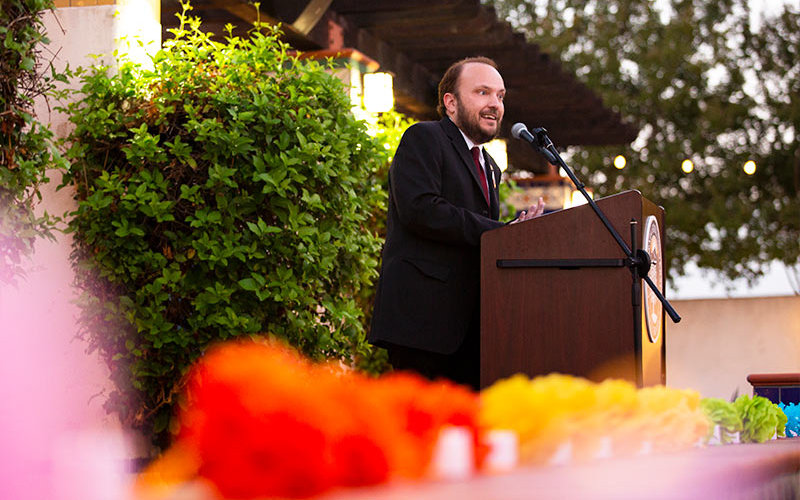
“Some of us have come out and felt support, acceptance and love — while others have come out to face anger, pain and rejection,” said Eric Price, a Cal State Fullerton assistant professor of counseling. “Despite these differences, all of us have the sense that just the simple power of support is important.”
Price, who researches the strengths, resiliency and support systems during the coming out process for LGBTQ individuals, was the keynote speaker for CSUF’s annual celebration of LGBTQ History Month Reception held Oct. 11, National Coming Out Day, at the Golleher Alumni House.
Reflecting on the theme “Coming Out,” Price shared his own story of being raised in a conservative small town and publicly identifying as a gay man for the first time while in college. Throughout the years, he would come out again and again to family members and friends, with varied responses.
“The more and more I experienced support from others, the more I was able to handle the struggles that came from rejection,” he reflected.
Now a therapist, counselor and educator, Price works with individuals who are at various stages in their coming out journeys. He also works with students and future counselors to help them think about how their own stories might impact their work with future clients.
Price explained how members of LGBTQ communities are at greater risk for depression, anxiety, panic attacks, substance abuse disorders, self-harm, suicide attempts and other mental health diagnoses — and individuals who then face discrimination and rejection during the coming out process are at an even greater risk for all of these factors.
“There’s good news,” he said, pointing to other studies that show how support, specifically from parents, can predict higher self-esteem and can protect LGBTQ individuals from harmful outcomes.
Offering four takeaways from his research, Price shared how family members, friends and allies can support to LGBTQ individuals during the coming out process:
- “Even if you think it is understood and automatic, confirming your unconditional love and support to your LGBTQ friends and family members is critical. Even in the most open-minded of families and friendships, every single person I have interviewed expressed some level of anxiety regarding disclosing their identity to others.
- “Be open to being engaged in your loved one’s life. Even the smallest acts, such as asking genuine questions to learn more, welcoming significant others into your friend groups or homes, and even just being with them throughout their coming out process, can make an enormous difference.
- “Be aware of today’s political climate and opportunities to be engaged with advocacy efforts. Several of the stories I’ve collected reflected an appreciation for family members who offered to attend protests, political rallies or pride events with their loved ones.
- “Many of the participants shared that they were grateful when disclosure was ‘no big deal,’ as people did not overdo it. It’s important to remember that people are so much more than their LGBTQ labels.”
During the reception, Price also introduced three students, who shared their personal journeys of coming out as gay, bisexual and transgender.
“As we celebrate National Coming Out Day and we reflect on the journeys of our LGBTQ-identified Titans, I want to thank them for stepping out and showing their authentic selves,” said President Fram Virjee, who hosted the reception along with his wife, Julie, and the Office of Diversity Initiatives and Resource Centers.
“So what does it take to create a community where we not only tolerate difference, but we celebrate it? From my perspective, what it takes is education,” said Virjee. “Higher education is the true pathway to success. It is the answer to much else that ails us in this nation. It is the cure for intolerance, discrimination and ignorance.”
For more information on resources available for LGBTQ-identified Titans, visit the LGBT Queer Resource Center website.